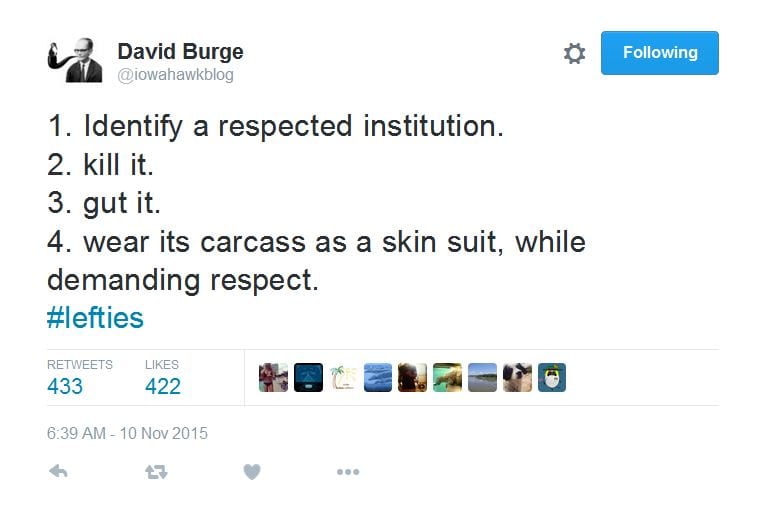MEGAN MCARDLE: Attention, Media People: Peter Thiel Changes Nothing.
To read the Internet as a journalist over the past 48 hours is to conclude that the media is on the verge of a holocaust. Not the boring old holocaust of falling ad revenues and clickbait-oriented business models, but a brand new holocaust, in which rogue billionaires are going to sue us all out of existence.
The proximate cause of the sky falling is the revelation that Silicon Valley billionaire Peter Thiel has been funding lawsuits against Gawker, apparently with the intention of destroying the company. These included the Hulk Hogan sex tape lawsuit, an invasion-of-privacy case which appears to have been strategically designed to cost Gawker as much money as possible. (A Florida jury awarded the former wrestler $140 million after it published the video, which he says happened without his consent. Gawker plans to appeal.)
Felix Salmon lays out why he thinks this is a profound threat to freedom of speech. “Thiel’s tactics in going after Gawker are very, very frightening for anybody who believes in freedom of speech” he writes; they’re also “extremely effective, in an evil-genius kind of way.” . . .
I find myself in agreement with the basic sentiment — powerful folks using their power to shut down speech they don’t like is deeply worrisome. That’s true whether those folks are Silicon Valley billionaires going after low gossip, or state attorneys general trying to shut down climate change advocacy they don’t like, or politicians using the power of the Federal Elections Commission to keep critical movies about them from airing during election season.
However, I don’t think this is an existential threat to journalism. I don’t think there’s an easy way to stop this sort of thing without stopping a lot of other stuff we’re rather fond of. And I think that journalists who have suddenly, belatedly discovered that harassing lawsuits funded by deep pockets might be a bit of a problem should ask themselves if it’s also a problem when they’re aimed at people other than them.
Let me start by laying out my position on the Hulk Hogan sex tape on the table: It’s vile and prurient, it has no news value, and its publication should have been stopped — not by fear of lawsuits, but by common human decency. Yeah, I’m a buzzkill. But I’m far more sympathetic to Gawker’s victims than to Gawker on this point, as I so often am when they self-righteously cloak repulsive clickbait in the proud trappings of First Amendment principle.
But my more considered reaction is that it’s actually pretty hard to establish a principle which protects important speech, but not the publication of the Hulk Hogan tape. Not impossible (obviously), but not all that easy. Journalists invade folks’ privacy all the time — that’s sort of our job — and drawing lines about whose privacy may be invaded, and when, is not easy for people with a strong commitment to free speech norms. Slippery slopes are real, and when they’re well-greased, you’d be amazed at the kind of acceleration you can get. . . .
The press seems to have suddenly discovered the troubling power of deep-pocketed third parties to make “the process the punishment.” This is particularly surprising in the case of Felix Salmon, who must surely be familiar with some of Eliot Spitzer’s antics against the financial industry. Those occasionally had a similar “Who cares if I’m right; you’ll go out of business long before I run out of filings” flavor to them.
Nor did people show quite this much outrage when states’ attorneys general started organizing a massive campaign against energy companies for having the temerity to oppose their public policy ideas about global warming. That campaign has included subpoenaing advocacy groups, a move that seems quite clearly designed to chill speech the government doesn’t like.
It’s fine when people fund lawsuits against Christian bakers.
Related: Billionaire-Owned Paper Worried About Billionaire’s Influence On Media. “Curiously unmentioned in the piece is Mexican tycoon Carlos Slim, one of the richest men on earth, with a net worth of more than $51 billion. That’s odd, considering that Slim is the largest shareholder of one of the most prominent media firms in the world: The New York Times Company.”




